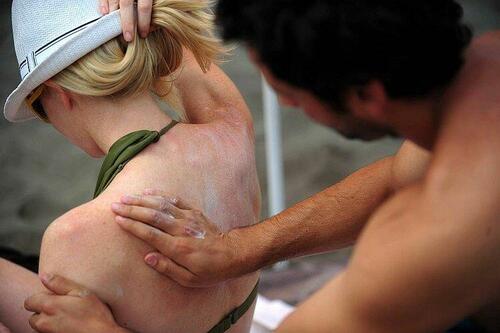Authored by Naveen Athrappully via The Epoch Times (emphasis ours),
Americans should “beware” of sunscreen products in mousse form as they may not be effective, the Food and Drug Administration (FDA) said in an Aug. 12 X post, with the agency sending warning letters to five companies marketing sunscreen products.

The letters were sent on Aug. 6 to Texas-based Supergoop, Pennsylvania-based Fallien Cosmeceuticals Ltd., Israel-based K & Care Organics, Sweden-based Kalani AB, and Florida-based Vacation Inc.
According to the agency, the sunscreen products marketed by these companies are sold as drugs. However, based on section 505 of the FD&C Act, sunscreens can only be approved for marketing in oil, lotion, cream, gel, butter, paste, ointment, stick, spray, and powder forms—and not in mousse and foam.
As for specific products under these brands, FDA took issue with Supergoop’s Play SPF 50 Body Mousse; Fallien’s TiZOs Sheerfoam Non-Tinted SPF 30 Mineral Sunscreen; K & Care’s Botao Grow Naturally Kids Mineral Foam Spray; Kalani’s Sunwear Sun Mousse; and Vacation’s Classic Whip Broad Sunscreen Mousse, among a few others.
Vacation was also warned regarding the packaging of its sunscreen products, which the agency said resembled “metal canisters ordinarily used to package whipped cream products and similar dessert toppings.”
“Packaging drug products in containers that resemble food containers commonly used by adults and children can mislead consumers into mistaking the products for food, which is of particular concern as this increases the risk of accidental ingestion,” the letter said.
The FDA gave the companies 15 working days to address the violations.
The Epoch Times reached out to the companies for comment but did not receive a response by publication time.
Sunscreen Safety
According to an FDA post last updated August 2024, the agency regulates sunscreen “to ensure they meet safety and effectiveness standards” just as it does with other nonprescription drug items.
For instance, the FDA has recalled sunscreens due to benzene contamination. Benzene is a chemical used to manufacture industrial products such as chemicals and dyes, and used in items like sunscreens. Long-term exposure via inhalation and skin absorption can lead to cancers and blood disorders, the agency said.
A recall related to benzene took place back in July 2022, when the FDA announced that Edgewell Personal Care Company was withdrawing three batches of its Banana Boat sunscreens from the market. Samples of the products were found to contain trace levels of benzene.
Many sunscreens also fail to offer the expected protection, according to a May 20 statement from the Environmental Working Group (EWG).
The group evaluated 2,204 sunscreen products and found that more than 77 percent performed poorly in terms of skin protection or contained potentially harmful ingredients.
“Wearing any sunscreen is much more important and offers better sun protection for your skin than not applying anything,” said EWG acting chief science officer David Andrews. “But not all sunscreens are created equal.”
On the positive side, 63 sunscreens from 13 brands were found to qualify for EWG’s Verified mark, which is only granted to products meeting high standards.
According to EWG, a major shift in the sunscreen market is the increasing demand for mineral-based products containing zinc oxide and titanium dioxide for UV protection, which are the only active sunscreen filters “generally recognized as safe and effective” by the FDA.
Loading recommendations…
















